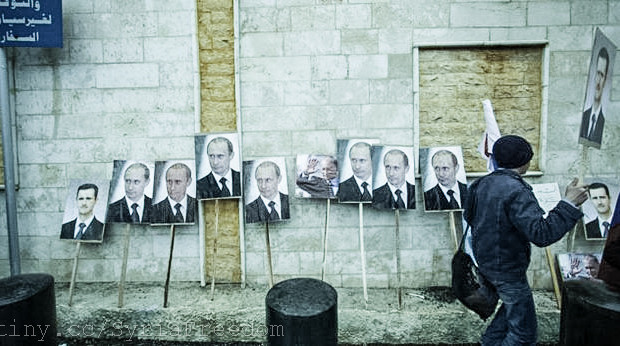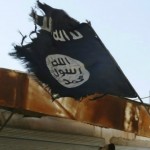by Derek Davison
A series of Russian moves to bolster support for dictator Bashar al-Assad and for a negotiated political settlement to Syria’s four-and-a-half-year civil war may allow for a new, unified focus on combating the Islamic State (ISIS or IS). But many questions remain about Russia’s true aims, America’s response, and the willingness of the Syrian parties themselves to negotiate an end to their conflict.
On Friday, the Obama administration announced that it would engage in military talks with Russian President Vladimir Putin’s government over Syria. Secretary of State John Kerry told reporters in London that “the president believes that a [military-to-military] conversation is an important next step.” Following that announcement, Moscow reportedly sent fighter jets to Syria in a move that Russian Defense Minister Sergei Shoigu said was “defensive in nature.”
Throughout the course of the Syrian civil war, Russia has supported the embattled Assad, whose family ties with Moscow stretch back to Soviet days. Russia has an important naval base in the Syrian port city of Tartus, and Putin has relied on Syria as his conduit for rebuilding Russian influence in the Middle East. But this support has so far been relatively indirect, taking the form of arms sales and protection on the U.N. Security Council.
Assad on the Defensive
Assad’s position in Syria has never looked more tenuous than it does right now. After losing control over almost all of Idlib Province to rebels and the important central Syrian city of Tadmur to IS over the spring and summer, the Syrian military lost its last remaining airbase in Idlib, and IS forces have taken the regime’s last major oil field. IS is now advancing on an important regime-controlled airbase in the eastern city of Deir Ezzor and is even threatening Damascus, Syria’s capital and Assad’s base of operations. Facing the loss of military manpower to casualties and desertion, Assad earlier this year pulled back the bulk of his remaining forces to try to defend the territory that still remains under his control: the area around Damascus and the core Alawite territory in Syrian’s northwest Mediterranean coastal region.
Perhaps in response to these setbacks, Russia appears to be taking steps to increase its engagement in Syria. On September 10, Reuters reported that Russian soldiers have started to participate in direct military action in support of Assad’s troops. Since then, American defense officials have said that Russia may be constructing a new air base near the Syrian port city of Latakia (“We’re obviously watching it very closely,” according to U.S. Navy Captain Jeff Davis). Another Reuters report said that Syrian soldiers were beginning to use “highly effective and very accurate” new weapons supplied by Moscow. The Russian government has confirmed part of this narrative, acknowledging that its “humanitarian aid flights” to Syria have also been bringing weapons into the country and that it does have forces in Syria acting as “advisers” to the Syrian military.
Russia insists that its aims in Syria are two-fold: to uphold its existing commitments to its ally, Assad, and to combat the threat posed by IS. On the latter point, there may be reason to believe what Moscow has been saying. IS has long had a contingent of Chechen fighters, whose eventual return home could pose a significant security risk for Russia. And this summer a Chechen group called Caucasus Emirate reportedly pledged its allegiance to Islamic State leader Abu Bakr al-Baghdadi. Earlier this month, the Caucasus Emirate claimed responsibility for an attack against a Russian military base in Dagestan. Russia maintains that supporting the Assad government is essential to combatting IS. As if to shore up that case, the Syrian air force has begun striking IS targets like the group’s “capital city” of Raqqa, something it has rarely done over the course of the war.
However, Russia may well be exaggerating the Chechen-IS connection in order to help justify its increased aid to Assad, since most Chechen fighters in Syria (at least near Latakia) are fighting for other Syrian rebel groups. Russia has strategic interests in Syria, like Tartus, that it wants to protect whether Assad remains in power or not and that may be motivating its recent show of force. Putin may also be using his continued support for Assad as a political statement to Russian audiences, as an example of his willingness to stand up to the West. There is also the question of Russia’s broader geopolitical aims to consider. This new commitment to the fight against IS comes just before Putin is scheduled to speak to the UN General Assembly later this month, and he may attempt to use Syria to pivot the world’s attention away from Russian activities in Ukraine while boosting Putin’s own stature as an important world leader.
Superpower Coordination
Direct military talks between the U.S. and Russia are absolutely essential if both countries are going to be conducting military operations in Syria at the same time. The consequences of some kind of accidental military confrontation between the two countries, brought on by a lack of communication, are too great. However, if the talks go beyond that and broach the topic of a political settlement to the war, this may represent another course correction for a U.S. administration that continues to struggle for a strategy to achieve its primary aim in Syria, the elimination of IS. Only a week before Friday’s announcement of talks with Russia, President Barack Obama publicly called Moscow’s support for Assad “a big mistake” that was “doomed to fail.” Earlier this week Kerry told Russian Foreign Minister Sergei Lavrov that Russia’s “continued support for Syrian President Bashar al-Assad risks exacerbating and extending the conflict.” Now, on the back of that purportedly doomed Russian policy, the two governments are talking to one another.
If the U.S. and Russia do engage in substantive talks on a political settlement to the civil war, the main sticking point will undoubtedly be Assad’s immediate future. This is a point on which leaders from both countries have shown some recent flexibility. Earlier this month, Putin declared that Assad was ready to hold parliamentary elections and to “share power” with opposition groups, though it’s unclear whether or not he had spoken to Assad about that. On Saturday, meanwhile, Kerry told reporters that although Assad needs to go, the timing of his departure is negotiable, and it “doesn’t have to be on day one or month one.” It’s not clear how either of these stances will align with the major regional players involved in Syria, like Assad’s primary supporter Iran (whose officials are trying to hammer out a Syrian strategy with Russia), and ostensible U.S. allies like Turkey and Saudi Arabia, whose hostility to any continuation of Assad’s government is well-established.
Meanwhile, the outcome of U.S.-Russia talks may not satisfy the demands of the factions doing the actual fighting in Syria. The Cold War model, where outside powers control and ultimately end a local or regional conflict, has long since ceased to be relevant, as the Syrian war has thus far made abundantly clear. The U.S., for all its considerable military and diplomatic power, has totally failed in its effort to build an army of Syrian rebels that primarily target IS. Virtually all of Syria’s rebels see Assad—whose air force alone has killed far more Syrians (especially Syrian civilians) than IS has—as their true enemy. Those rebels have rejected any political settlement to the war that leaves Assad in power even as part of a temporary transitional government.
On the other hand, Assad has steadfastly refused attempts to coerce him into stepping aside, saying that he will remain in office until “terrorism” is defeated (which sounds open-ended enough to mean “forever”). In this sense, recent reports that the West “rejected” a 2012 Russian offer for Assad to step down—an offer that appears to have been made without any input from Assad himself—must be considered suspect at best. Assad’s best hope for maintaining a long-term grip on power may be to force a partition of Syria along the war’s current battle lines. The terms of a ceasefire agreement announced on Sunday between the Jaysh al-Fatah militia and the Assad government appear to recognize at least a de facto partition, acknowledging rebel control in Idlib in exchange for regime control over the city of Zabadani, along the Syria-Lebanon border. However, the same arguments against the advisability of partitioning Iraq (chiefly, that partition generally leads to more, not less, violence) also apply to Syria.
At a September 10 event in Washington on finding a “sustainable solution for Syria,” sponsored by the Center for the Study of Islam and Democracy, Syrian activist Mohammed Ghanem said that the international community faces two choices when dealing with Syria. It can remove Assad from power in order to “restore Syrian unity” and allow full focus on fighting IS. Or it can watch the civil war and resulting humanitarian crisis continue “indefinitely.” It’s not at all clear that U.S.-Russia talks can actually remove Assad from the equation. On the other hand it is clear, at a time when former U.S. generals and CIA directors are suggesting that America arm al-Qaeda (specifically, Syria’s Nusra Front) to fight IS, that whatever the U.S. (and the EU, for that matter) has been trying with respect to Syria has failed. Simply talking to Russia may not help, but it’s hard to see how it could make things any worse.
Photo: Signs from a pro-Assad demonstration in Damascus in front of the Russian embassy (courtesy Freedom House via Flickr)






Soviet Russia made a mess out of Afghanistan in late 1970’s and then handed off the broken society to the US! Subsequently Reagan poor policies created the Taliban and Al-Qaida in Afghanistan further causing the fracture of fabric of that society until to date!
The cause and sequencing of events in Syria are just the opposite of those events in Afghanistan! This time the NEOCONS and the Neozionists initiated the mess in Syria which the current US administration was and still is incapable of solving! Consequently this time around Russians are coming to assist their ally in Syria! In the nutshell the US is returning the favor to the Russians by handing off the mess in Syria to them!
It’s hardly appropriate to called the democratically elected leader of Syria a dictator. That just as bad as a country thousands of miles away deciding on regime change…not very democratic